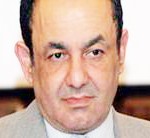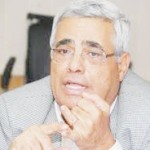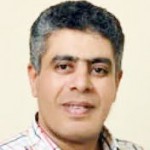As president Mohamed Morsi continues to assume his tasks as Egypt’s first civilian president, a few columnists in Egyptian newspapers have rejected the idea that Morsi shall cut ties with his Freedom and Justice Party (FJP) and become a truly non-partisan president.
Other columnists have paid tribute to the Supreme Council of Armed Forces (SCAF) for fulfilling their promise with regards to transferring powers to a civilian president.

Amr Al-Shobaki
Al-Masry Al-Youm
In his column, ‘The partisan president,’ Amr Al-Shobaki denounced those urging the newly elected president Mohamed Morsi to quit his Freedom and Justice Party and the Muslim Brotherhood.
Al-Shobaki said in modern democracies, any president rising to power on the shoulders of a political party, has a clear partisan agenda.
It is by virtue of the party’s ideology and vision voters are convinced to elect the president.
It is equally hard to imagine Morsi, after long years with the Brotherhood, rejecting the principles of the party and the Revival Project based on his predecessor’s abuse of power.
In Al-Shobaki’s estimation, the case of Hosni Mubarak is hardly comparable with Morsi, in the sense that Mubarak did not necessarily need to operate through the NDP.
In the last presidential elections, Al-Shobaki said the only candidate affiliated with a political party was Morsi, while his counterpart’s campaign revolved around an independent vision for the future of Egypt.
The writer said having the support of a party was a clear advantage for President Morsi.
In the meantime, Al-Shobaki stressed the need to limit the powers of the president and his political party and reject any attempts to infuse the judiciary system, the army, and the police with party politics.
If the Freedom and Justice Party did in fact attempt to inoculate itself inside other branches of the government, it would mean a return of the former political machine of the NDP.
He said nearly 70 journalists belonging to a major national newspaper have recently applied for membership into the Freedom and Justice Party, in the hopes that their party affiliation would carry them swiftly to the top ranks of the journalist syndicate.
Al-Shobaki suggested the issuance of legislation preventing the president, his political party, and also the opposition, from influencing the judiciary and the legislative authorities.
At the end of the day, the president cannot be hindered from his right to identify with a political party representing his political orientations and agenda, and it is up to voters to accept or reject.

Hassan Nafaa
Al-Masry Al-Youm
Hassan Nafaa examines the restrictions faced by Egypt’s President Mohamed Morsi, in light of the Supplementary Constitutional Declaration issued by the Supreme Council of Armed Forces (SCAF).
Not only does this declaration deprive the president from appointing a minister of defense other than the current head of the SCAF, Field Marshal Hussein Tantawi, but it also compels him to maintain the same current formation of the SCAF.
In short, Morsi is banned from making any decisions about the army, until the Constitutional Drafting Committee completes the new constitution.
Nafaa foresees that the role played by the SCAF in the coming period will not be confined to the administration of the armed forces affairs, but will extend to the political sphere.
The SCAF has the right to object to any clause in the new constitution, a situation which will turn Egypt into an entity being run by two heads in two opposite directions.
From another perspective, Morsi is the first elected president after a popular revolution, and proclaims himself the legitimate and natural representative of the revolution’s goals.
In contrast, Tantawi considers himself in a situation where he has to show no compromise in protecting the state’s institutions from revolutionary acts.
Nafaa describes this scene as competing conflict of interests between the revolution and the state, putting the country in an uncomfortable situation.
While many see this situation as offering protection for both the state and the revolution, others describe it as catastrophic to both.
Nafaa assesses this dilemma as a critical stage of transition, necessitating extreme wisdom and cooperation from both parties, until the achievement of the revolution’s objectives.

Ammar Ali Hassan
Al-Watan News
Ammar Ali Hassan recalls when, two years ago, he left his house toward Al-Faraen channel to appear in ‘Egypt Today’ programme with Tawfik Okasha, after he phoned him numerous times to discuss the issue of the Muslim Brotherhood and the state.
Hassan found Al-Faraen channel’s car waiting for him in front of his house, and immediately sat next to the driver.
After approximately one kilometer, he felt the presence of Mohamed Morsi in the back seat. After both Morsi and Hassan made their appearance on the show, Hassan requested from the driver to drop off the elder Morsi first, but Morsi requested the opposite since Hassan lived farther away.
Hassan recalls these memories, and compares them to the current situation, where Morsi is the president of the republic and Okasha is staunchly attacking him.
In the past, Al-Faraen channel was in its early days, trying to secure itself a spot in the middle of the rigorous competition between Arab satellite channels, Hassan notes.
Despite being linked with the National Democratic Party (NDP), Okasha used to invite iconic opposition figures to his talk show, and discuss with them issues such as corruption, the future of the presidency, and the performance of the executive and legislative authorities. On the other hand, opposition activists were desperately searching for a podium to express their resistance to the former regime.
It was in this context that Morsi appeared on Al-Faraen channel to slam Mubarak’s regime and to rebut allegations of the Muslim Brotherhood collusion with the NDP in the parliamentary elections of 2005.
Now things have changed, and Morsi has become the president fiercely criticised by Al-Faraen channel.
Hassan predicts the relationship between Al-Faraen and the brotherhood cannot be predicted, and that the foes of today, can all be the friends of tomorrow.

Emad Al-Din Hussein
Al-Shorouk News
Emad Al-Din Hussein examined President Mohamed Morsi’s statements before the commanders of the Supreme Council of Armed Forces (SCAF) last Saturday, in the Hike Step military compound.
Morsi praised the SCAF and vowed to safeguard the army and its personnel.
While Hussein’s assessment is that Morsi made such statements out of his attempt to cease hostilities with the junta, he reiterates that comprehensively, Morsi was politically smart.
While nobody believed SCAF would organise true presidential elections, the opposite happened.
The SCAF did not impose Omar Suleiman on the populace, and even Ahmed Shafiq, who many believed was a SCAF favorite, lost to the
Muslim Brotherhood.
After the rise of Morsi to power, many were expecting the SCAF to cancel the election’s results and take control of the country.
However, the proceedings of last Saturday put an end to these speculations, when the SCAF officially handed over power to the elected president.
Hussein considered this as a qualitative success for the revolution, which succeeded in imposing its candidate.
Though, still, many revolutionaires believe Morsi is neither a revolutionary or a leader seeking to dramatically alter the political landscape.
In addition, the author lauded Morsi’s speech before the nation’s representatives in the main hall of Cairo University as a rebirth of the Egyptian civilisation.
Despite the necessity to pay tribute to the SCAF, Hussein pinpoints some of the major errors committed by the military junta with regards to their poor management of the transitional period, which ended with Egyptians unwilling to vote for either Morsi or Shafiq in the presidential elections run-off.
In conclusion, Hussein regarded last Saturday as the first step on a long road toward a real democratic, civil, and modern state.


